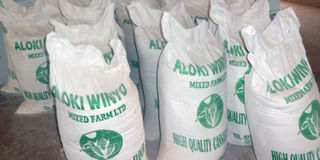Farmers milling money from cassava

Cassava flour ready for sale. Farmers are encouraged to add value to their product and make more money. Photo by Lominda Afedraru.
Cassava which is grown across the country is now being considered as an industrial good mainly used by breweries and confectionary industries.
Farmers usually practice the traditional method of uprooting cassava which is peeled and the tuber is chopped and left to dry before it is processed into flour.
However with high demand of quality cassava flour by the brewery industry, a number of cassava milling factories have come up with a technology where fresh cassava harvested from the garden can be chipped, dried and processed into flour instantly.
One such agro processor is Win Wood Millers based in Lira who are processing instant cassava flour using a technology where heat is generated by burning wood fuel in an oven where heat passes through a channel to the drying panel.
Mr Allan Otim the operations manager while interacting with a team of managers from Uganda Breweries Ltd (UBL) who were on a fact finding mission engaging their clients who provide them with quality flour had this to explain.
He notes that Win Wood Millers was set in the year 2011 by its proprietor Mr Ivan Okor with the major aim of processing quality cassava as an industrial good.
There after the processor entered into an agreement with UBL to provide high quality cassava flour which is used for brewing beer and the capacity of the processing factory was expanded.
Plant management
Otim explains that they do work with groups of farmers growing cassava in Lango sub region who sell the roots directly to the factory.
There are about 300 farmer groups in total but there are also individual commercial farmers who supply the factory with fresh cassava.
Every five tonnes of fresh cassava is bought at Shs1.5m and so farmers are advised to supply the factory by bulking their produce.
The factory has no limits in purchasing for as long as the farmers are providing quality cassava tubers.
Processing procedure
The wet section
Upon purchase from farmers, it is peeled by labourers employed by the factory and thereafter taken to the washing chamber to ensure it is thoroughly washed to make it clean.
It is soaked in water over night to ensure the cyanide is completely removed.
Thereafter cassava is placed in machine grater which grinds it into wet cake.
The cake is then placed in another machine which is used to press the cake in order to extract the starch and cyanide contained in the cassava cake.
The product comes out as compacted dry cake which is later transferred to the drying grater machine which breaks it into pieces.
This is taken to the flash drier which has been infused with heat generated from the oven and the particles are dried ready for milling.
Apparently the plant has capacity of milling seven metric tonnes per day and the factory is capable of supplying between 20 – 30 metric tonnes every month to UBL and other confectionary industries.
The team intends to increase the processing capacity to 20 metric tonnes per day due to increasing demand of the product by the various industries.
Kiryandongo plant
A similar cassava processing plant using the same technology owned by Mr Sosimu Twesiga.
Like UBL, Twesiga who built a processing mill in Kiryandongo District has also organised the farmers into groups. The processing plant has small scale grating machines, which are used to chip the cassava tubers. Chipping helps to reduce the drying period. Grated tubers of approximately 2mm in thickness can dry in less than four hours saving both cost and time.
After which, the chips are laid on tables or tarpaulins to dry. It is not recommended to dry on bare ground because it compromises the quality of the product.
According to Twesiga, currently his team is processing cassava flour for the open market since UBL is no longer purchasing from them.




